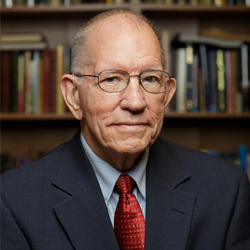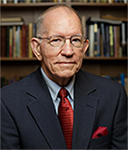 Albert N. Martin Throughout his nearly fifty years of ministry, Albert N. Martin has been a recognized evangelist, counselor, pastor, and preacher. In June of 2008, Pastor Martin stepped down from his role as one of the pastors at Trinity and he and his wife, Dorothy, relocated to Michigan. His labors include lecturing on Pastoral Theology in week-long modules which are being recorded for training men for the ministry, preaching at conferences and churches, and writing.
Albert N. Martin Throughout his nearly fifty years of ministry, Albert N. Martin has been a recognized evangelist, counselor, pastor, and preacher. In June of 2008, Pastor Martin stepped down from his role as one of the pastors at Trinity and he and his wife, Dorothy, relocated to Michigan. His labors include lecturing on Pastoral Theology in week-long modules which are being recorded for training men for the ministry, preaching at conferences and churches, and writing.
His books, Preaching in the Holy Spirit and Grieving, Hope and Solace, were recently published. Another book entitled You Lift Me Up has been published by Christian Focus. A booklet entitled The Christian Wedding in a Changing World has been published by Chapel Library. The same publisher has published a larger booklet entitled Counsels to Pastors’ Wives. He has three children, seven grandchildren, and two great-grandchildren. Through his marriage to Dorothy, he has an additional five children, twenty-three grandchildren, and five great-grandchildren.
Our Vision for These Days 2: A Return to Biblical Holiness
 Albert N. Martin
Albert N. Martin
Now, I take up with you the second element of Our Vision for These Days, namely, a renewal of biblical holiness. What I purpose to do in the time allotted is to speak of our vision for these days with reference to a renewal of biblical holiness under these three headings. First of all: the centrality of holiness in the purposes of redemptive grace. Secondly: the indispensability of holiness in the application of redemptive grace. Then: a sketch of the theology of holiness in the outworking of redemptive grace.
Our Vision for These Days 3: A Return to Biblical Churchmanship
 Albert N. Martin
Albert N. Martin
Now, we come to take up the third of these things that constitute our vision, not in a sense that we have had some supernatural revelation, but the word “vision” being used synonymous with our perspective concerning the great need of these days. The third strand of our vision of these days is what I have entitled “A Return to Biblical Churchmanship.”
Our Vision for These Days 4: A Restoration of Biblical Preaching
 Albert N. Martin
Albert N. Martin
Believing that the vast majority of you are already convinced of the primacy of preaching and the saving purposes of God, I have chosen to take no time to establish that fundamental tenet of the things most surely believed among us, but assuming that we are agreed in that conviction, I pass on directly to the subject of our vision for a restoration of biblical preaching. If we are to pray for such a restoration, if we are to labor for such a restoration, and if we are to recognize the answer to our prayers and measure our progress in sanctified endeavor for the restoration for biblical preaching, we must begin with giving, at least, the main concerns which identify such preaching.
Our Vision for These Days 5: Recognition of Pastor as a Watchman
 Albert N. Martin
Albert N. Martin
Where do we gain the concept of the servant of God ministering under the New Covenant as a watchman amongst God’s people? Well, when we turn to the Old Testament and seek to discover the beginnings of the biblical concept of a watchman, we find that the watchman was the man assigned the responsibility of standing upon the wall of a city or a military garrison in order to look out for approaching dangers to that city or to that garrison, and with a solemn responsibility in a context of conscious alertness and wakefulness, when perceiving that danger, to alert the proper authorities.
Our Vision for These Days 6: A Return to Domestic Piety
 Albert N. Martin
Albert N. Martin
Now, I wish to address the sixth area of crucial concern, which does, indeed, constitute a vital part of our vision for these days. I’ve stated it this way: it is the reestablishment of godly family life, or in the more antiquated terminology, the return to domestic piety. What we would call in current parlance “godly family life,” our forefathers designated as “domestic piety.”
Our Vision for These Days 7: A Recovery of Biblical Worship
 Albert N. Martin
Albert N. Martin
Our vision for these days, in terms of a passionate concern to see a recovery of biblical worship. Now, in taking up so vast and crucial a subject as biblical worship, I am doing so with a very limited field of focus, namely, the public worship of the gathered people of God in their seasons of stated gathering for such worship. I state this fact that the outset, because I’m fully aware that the biblical doctrine of worship is both exceedingly broad and deep. In bypassing many other crucial aspects of the more comprehensive biblical doctrine of worship, I have no intention, in so doing, of demeaning those other aspects, nor do I consider the matters of little importance or unworthy of extensive and careful instruction from the Scriptures.
